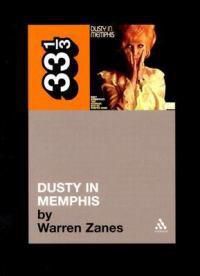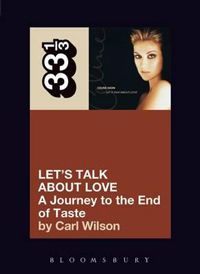The 33⅓ series of books is based on a deceptively simple concept: each instalment is a short critical monograph about a seminal pop music album. Since its inception, the series has displayed a diversity not only in terms of the albums covered – some of which sit very far outside of the traditional pop music canon indeed – but also in terms of the approaches that the series’ authors take to those albums. Although each entry in the series – the 100th book of which has just been released by Bloomsbury Academic – will be of interest to fans of that particular album, a number of entries in the series are more broadly notable because of their innovative approaches to criticism, the unusual nature of their subject matter, or the identity of their authors. Here are five of the series’ stranger outliers.

Dusty in Memphis by Warren Zanes
This, the first book in the series, sets its wide-ranging tone. Zanes is both an accomplished author and a musician best known for his work in The Del Fuegos, and his entry on Dusty Springfield’s Dusty in Memphis is crammed with incidental detail, anecdotes, and jokes. (He even spruiks a product that removes the smell of cat urine.) The choice of album is telling, too: rather than opening predictably, with an album by some masculine paragons of rock virtues, the series instead opens with a brilliant, but at the time of its release deeply misunderstood, pop album by an openly queer woman.

Let’s Talk About Love by Carl Wilson
Wilson freely admits that he hates not only the album he’s written his book about, but also its performer, Céline Dion. This doesn’t prevent Let’s Talk About Love from being the series’ outstanding success story – a bestselling analysis of taste, hatred, sentimentality, coolness, and cultural capital. Its success is owed entirely to Wilson’s erudite style, which is by turns humorous, nerdy, and surprisingly moving, rather than to the album, which remains just as bad as it ever was.
(Let’s Talk About Love has been recently re-released in an expanded and updated edition with critical responses by a number of other writers, a first for the series.)

Meat is Murder by Joe Pernice
While John Darnielle’s later book about Black Sabbath’s Master of Reality would become one of the series’ most controversial instalments, this, the fifth book of the series, beats it to the punch by being not only the first fictional book in the series, but also the first penned by an indie musician moonlighting for the first time as an author. Readers expecting a thoroughly-researched historical account of The Smiths’ 1985 album Meat is Murder will be disappointed by Pernice’s semi-autobiographical novella about teenage obsession and unrequited love, but readers with an open mind will cherish Pernice’s attention to detail and his knack for eloquently capturing the febrile atmosphere of young adulthood.

69 Love Songs by LD Beghtol
This entry in the series breaks all of the rules of propriety: it is written by a musician who was a member of The Magnetic Fields at the time of 69 Love Songs’ recording, it eschews sustained analysis, and it even messes up the series’ numbering. (It should have been numbered entry 42 but – of course – is listed as entry 69.) Despite this, it’s a beautifully-produced book (with a bespoke layout based on the album’s liner notes, created by Beghtol himself) of minutiae and curiosities about an album with a deserved cult following. It even comes with its own crossword puzzle.

20 Jazz Funk Greats by Drew Daniel
This entry deftly combines all of the series’ strong points – journalistic investigation, interviews with band members, in-depth critical analysis, and memoir. What makes it stand out, however, is both its subject matter and its author. 20 Jazz Funk Greats is Throbbing Gristle’s mutant pop/disco masterpiece, a perverse reaction to the way that their prior albums of confronting aural assault had been lumped in with punk rock. Daniel, the author, is a latter day polymath: not only an Associate Professor at Johns Hopkins (specialising in Shakespeare) but also one half of the band Matmos and a solo musician under the moniker The Soft Pink Truth.
Chad Parkhill is a Melbourne-based music critic and a recipient of a 2014 Wheeler Centre Hot Desk Fellowship.


